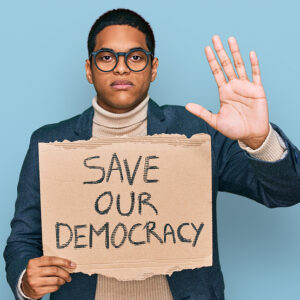It’s bad enough that authoritarian regimes, especially those in Moscow and Beijing, are seriously threatening democracy. Worsening matters is that too many democracies, some very young, are moving away from their institutional roots and liberal-minded values. In places like Hungary, Tunisia and Brazil, leaders seek to consolidate power, squelch dissent, undermine an independent judiciary, or attempt to control or manipulate the flow of reliable information.
Some stalwart democracies, including our own, also show signs of stress. The hyper-polarization, spread of disinformation and questions about the integrity of elections are reasons Americans should act now to shore up our democratic foundations.
We recently spent two months speaking with experts about how nations can become and/or remain vibrant democracies. These three points stood out from our interviews:
—Freedom cannot be won alone. Venezuelan dissident Leopoldo Lopez, who spent seven years as a political prisoner — three of them in solitary confinement — emphasized how activists must band together in a global fight for freedom.
Partnerships are key to creating and sustaining liberty globally. The preeminent example is the Trans-Atlantic Alliance, which has supported Ukraine’s fight against unprovoked Russian aggression. The alliance’s unity remains critical to supporting Ukraine’s defense of its land and liberty.
Each of us who believes in democracy likewise must recognize the real, continuing struggle between democracy and authoritarianism. The need is particularly acute in once-emerging democracies like Hungary. Authoritarians such as Hungarian Prime Minister Viktor Orban use democratic means to achieve undemocratic ends.
“Democracy has won the rhetorical battle, but democracy itself is in danger worldwide,” Marie Yovanovitch, the former U.S. ambassador to Ukraine, pointedly said.
Hungarian political scientist Peter Kreko, in particular, worried about his nation becoming an “information autocracy.” In such autocracies, leaders use control of information as opposed to violence and oppression to give their regime the patina of legitimacy and to change how citizens and voters act.
Recognizing the Free World is in a fight doesn’t mean military battles. But it does mean being clear and credible on developing consequences for autocrats who lash out against the liberal democratic order. If we don’t view this period as a battle between freedom and tyranny, and commit to the necessary vision, mission and resources, we are setting ourselves up for failure.
—Democracy is more likely to take root when nations have a strong underlying culture and the conditions for an open society. Toomas Hendrik Ilves, who led Estonia as president from 2006 to 2016, described how democracy activists were working on a constitution within three weeks of Estonia’s declaration of independence from the Soviet empire. Estonians had their own vibrant culture and never wanted to be like their Russian oppressors.
Non-governmental organizations such as the National Endowment for Democracy are crucial in helping seed open societies. NGOs can support the creation of a vibrant free press, an unencumbered exchange of ideas, the rule of law and other democratic fundamentals.
Of course, creating the conditions for an open society takes time. Former Costa Rican president Luis Guillermo Solis noted that nations must go through a fermenting process in letting their democratic convictions take root. Patience is required where attempts at democracy are relatively young.
Still, Washington should keep investing in global initiatives that help democracy take root. NGOs should continue building civil societies. And we citizens should support these efforts. Democratic institutions and liberal values require patience andnurture.
—Even strong democracies like ours need bolstering. Rep. Liz Cheney, R-Wyo., stressed a renewal of civics education. She rightly argued for students studying the Constitution and America’s founding.
“We need to make sure that people recognize and understand what it really means to be a nation of laws,” Cheney said.
Relatedly, states should keep investing in the technologies and refining the processes that keep our elections safe and secure. Meanwhile, state and local election officials, along with civic organizations, should double down on engaging more citizens, especially young Americans, to register to vote, cast their ballots, and otherwise participate in elections.
As Cheney put it, “As citizens, we have obligations. And those obligations require that we defend our institutions and not be bystanders. It is a miraculous structure that our Founders established.”
Ours is a troubling time for democracy. But those on the side of human dignity, an open society and a nation of laws can prevail if we who live in freedom take our responsibilities seriously.

